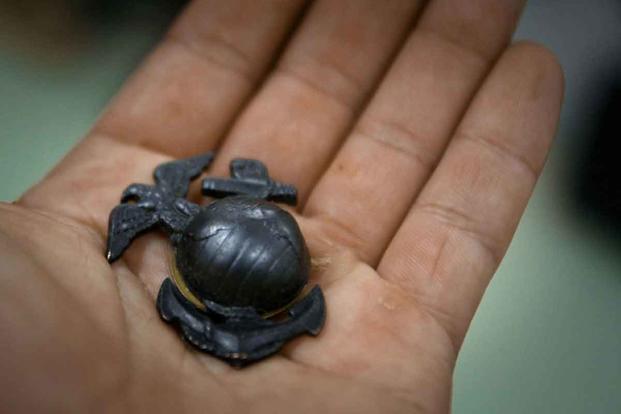Editor's Note: This story has been updated with comment from Christopher Semok after he contacted Military.com and confirmed the details disclosed by the Marine Corps.
The Marine Corps said that it discharged a recruit from its delayed-entry program after he admitted to having a history of membership in neo-Nazi groups.
Christopher Semok enlisted in the Marines on Sept. 21, 2022, the service said. That enlistment seemed to come after a long history of antisemitic activity and Nazi-driven vandalism that was documented by various anti-fascist groups online.
Read Next: Deliveries of F-35s and Engines on Hold in Latest Fallout from Texas Crash
In September 2021, a Twitter anti-fascist account seemed to first connect Semok to his online persona by claiming he was responsible for vandalism and harassment around Broward County in Florida. Then, in January 2022, an Atlanta-based anti-fascist group claimed Semok attended training with the white supremacist group Patriot Front. The same group also posted photos in February that it said were of Semok wearing an outdated Army battle dress uniform and a World War II-era German military combat helmet; later updates suggested his alleged activities continued into March.
Task & Purpose was the first outlet to report Semok's discharge.
Military.com spoke with Semok on the phone on Thursday, and he confirmed that he was a member of various extremist groups, including Patriot Front and the National Socialist Movement, from around the age of 13 until he began to cut ties in 2022.
It's not clear how the Marine Corps eventually became aware of Semok's alleged ties to these extremist groups. The Marines' statement noted that "all Marine Corps applicants fill out and sign an Aberrant Behavior Screening Form, which asks about prior violent behavior, open treason or advocating the overthrow of the U.S. government" -- a question that was introduced in the months after the riot on Jan. 6, 2021, and renewed attention to the problem of extremism in the ranks.
"Mr. Semok did not answer "Yes" to any of these questions," the Marines said.
On Dec. 6, the executive officer from the Tampa recruiting station called Semok in for an interview.
"During the inquiry, Mr. Semok admitted that he had been affiliated with neo-Nazi and anti-Semite groups, active on social media and at activist demonstrations," the Marine Corps said in its statement.
Semok confirmed the conversation and said that he told the officer "exactly what it was and I tried to make it clear to him that I'm not in that life anymore."
"I was honest with him," he added.
When asked why he didn't admit as much on his enlistment paperwork, Semok said "he was no longer part of these groups," having broken ties in August.
"The question asked if I was currently affiliated with any groups that were extremist, wanted to overthrow the government, or anything like that, and I wasn't at the time so I answered 'No,'" Semok explained.
On Jan. 1, 2023, the Corps decided to discharge Semok after the recruiting station "found it was in the best interest of national security to not let Mr. Semok remain."
Semok says he's now working with several groups to continue his deradicalization.
The entire incident appears to fit into a theme of recruits and service members with extremist ties slipping through the screening processes to join the military only to be discharged when identified by law enforcement or members of the public.
In August, Army Spc. Killian Ryan was booted from the service after an FBI Joint Terrorism Task Force discovered ties to white nationalism and threats of violence against minorities on social media accounts.
"I serve for combat experience so I'm more proficient in killing n-----s," Ryan wrote in one social media post on May 27, 2021, according to court documents in his case.
In November, it was revealed that a 19-year-old was able to participate in the unrest of Jan. 6 and later enlist and ship off to basic training for the Air Force. He was not discharged until after FBI agents showed up to question him while he was at Lackland Air Force Base, Texas.
Outside experts have routinely criticized the military's screening as inadequate to deal with the problem of extremists.
Katherine Kuzminski, the senior fellow and program director for military, veterans and society at the Center for a New American Security, based in Washington, D.C., told Military.com in an interview in December that "the best metrics now for screening are tattoos."
Once recruits make it past their initial training, the Pentagon has said it will look to unit commanders to enforce the anti-extremism policies they have in place while stressing that it will not conduct systematic surveillance of service members' social media accounts to find infractions.
When asked about Semok's case, Kristofer Goldsmith, an Iraq War veteran who has spent years studying extremism in the ranks, told Military.com that he wants the Pentagon to answer the question: "What is the military doing to hold people accountable for allowing neo-Nazis to sign up?"
On several occasions when asked about extremism, service officials have repeated the comment, "The Marine Corps takes allegations of racism, fascism and other forms of discrimination seriously."
-- Konstantin Toropin can be reached at konstantin.toropin@military.com. Follow him on Twitter @ktoropin.
Related: The Pentagon and the VA Need to Do More to Battle Veteran Extremism, Congressional Report Finds













